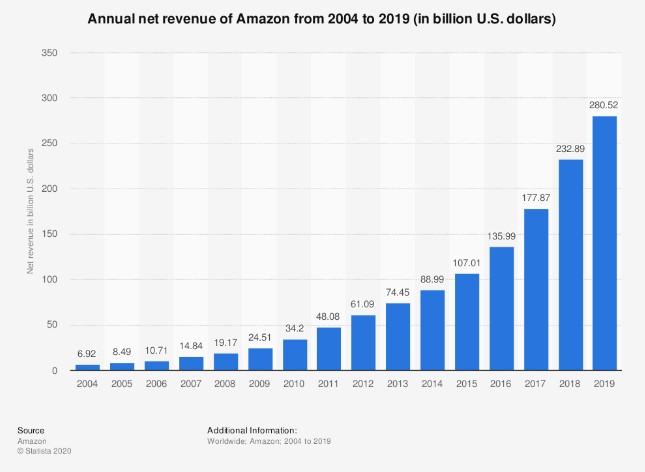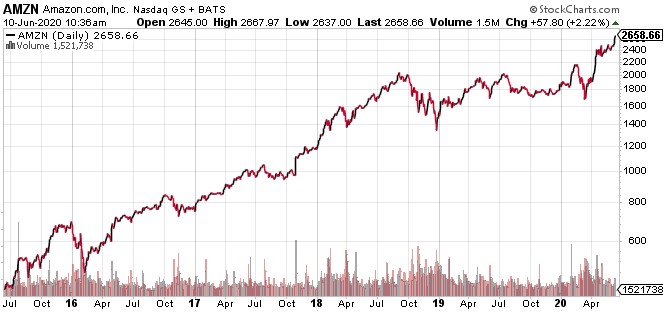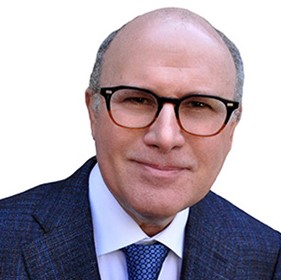Amazon Builds Medical Lab Business to Thwart Pandemic
Amazon.com (Nasdaq: AMZN, Rated “C+”) has a COVID-19 problem at its warehouses. Infections are growing and an eighth employee died in May.
CNBC reported Tuesday that sources claim the ecommerce company will soon build self-contained diagnostic labs within its fulfillment centers. The plan is to test most workers every two weeks.
It’s a monumental task.
The obvious issue is scale. From its roots as a tiny business operating out of Jeff Bezos’ suburban Seattle home in 1994, Amazon.com now employs 840,000 people globally. The business has workers scattered across 185 fulfillment centers in 30 countries around the world.
Getting reliable tests to these employees on an ongoing basis will require new systems and innovation.
Luckily, Amazon has plenty of resources to make the investment. In May, Bezos told shareholders in a letter to “take a seat” as the company invested $4 billion keeping its employees safe. The eye-watering sum would erase all of the profits expected in the second quarter.
To tackle testing, the company is hiring research scientists, program managers, procurement specialists and software engineers, according to CNBC. Presumably, they will collaborate with Lab 126, its skunkworks operations.
The Sunnyvale, Calif.-based subsidiary was founded in 2004. It is best known for developing the Kindle line of eBook readers. The problem solving required for consumer electronics morphed into machine learning and later Alexa, the wildly popular artificially intelligent digital assistant.
Now, Amazon is throwing all of those talents at diagnostic testing.
In addition to standard nasal swab testing, sources say the company will pursue regular employee temperature checks and pulse oximetry screening. The process measures blood oxygen levels with a small clamp-on fingertip sensor.
Without question, all of this is going to be very expensive. But Bezos is betting it’ll all pay off.
Amazon is essentially building a scalable, next generation healthcare business. But in the era of novel coronaviruses, scarce testing and productivity loss, this could be a valuable asset. And it could become a business in its own right.
One of the best lessons of Amazon’s growth is the way the company makes seemingly gigantic bets on new platforms. In reality, these investments are only possible because the new businesses have a persistent, captive customer in Amazon.com.
It’s the story of Amazon Web Services, its cloud computing subsidiary, and Fulfillment by Amazon, its logistics network.
These businesses were founded to support the needs of the online store. However, massive investments in data centers, computer and telecommunications equipment, warehouses, cargo planes, shipping lines and software became valuable to other enterprises as well.
AWS had net sales of $35 billion in 2019, about double the 2017 run rate. According to the Amazon blog, Fulfillment by Amazon accounted for 58% of Amazon.com sales in 2018, leading to $13 billion in fees during the fourth quarter alone.
In addition to providing fulfillment to millions of small businesses, large businesses like Apple (Nasdaq: AAPL, Rated “C+”) are using FBA, too. The attraction is access to millions of Amazon customers, and simplicity. It’s really a pay-as-you-go add-on service.
A healthcare business has that same kind of potential.
Amazon has been slowly putting together the vital pieces. In June 2018, the company acquired Pillpack, an online prescription drug company. In September, it joined forces with Berkshire Hathaway (NYSE: BRKA, Rated “D+”) and JPMorgan Chase (NYSE: JPM, Rated “D-”) to launch Haven Healthcare, a health insurance provider devoted to reducing costs. Adding diagnostics and lab services in so many locations would be an appealing package for lots of businesses both big and small.
At least in the early stages, the health service will be confined to the Amazon AtoZ intranet. Warehouse workers will be given access to an online portal where they will check their confidential test results. Workers testing positive will get follow-up from a telehealth provider.
Amazon shares reached a new high Tuesday, closing above $2,600 for the first time ever. The stock trades at 69.9 times forward earnings and 4.3 times sales. While these metrics may seem expensive, the price is fair given the explosive potential of the new businesses.
Growth investors should consider buying shares into weakness.
Best wishes,
Jon D. Markman





